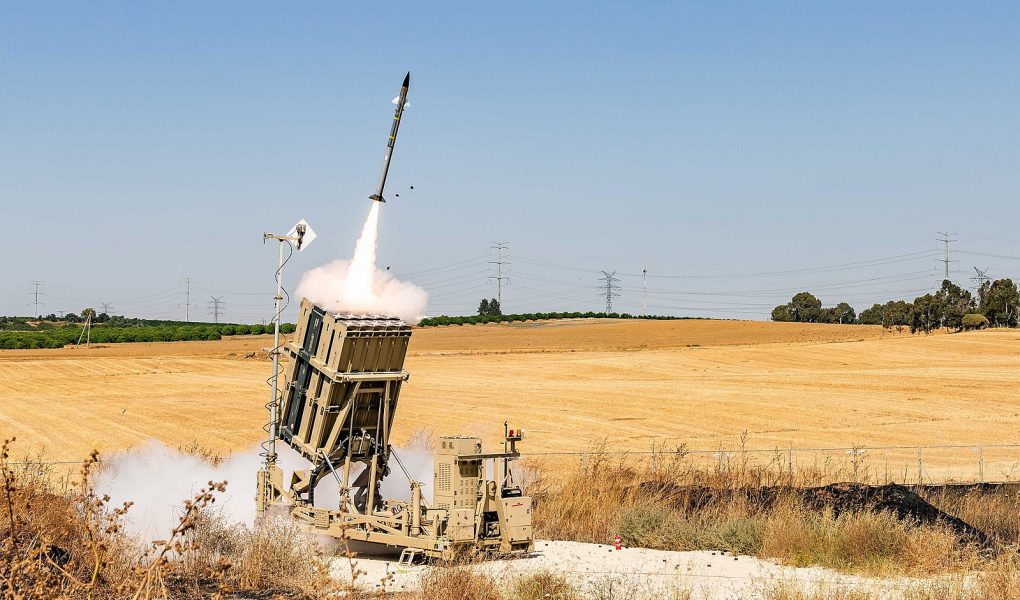Amit Agronov / IDF Spokesperson’s Unit
Progressives in the House of Representatives stripped $1 billion for Israel’s Iron Dome missile defense system from a must-pass continuing resolution to fund the government last week. In so doing, they were putting prejudice and politics above peace and handing a victory to the Iran-backed Hamas regime in Gaza, which tyrannizes Palestinians and terrorizes Israel. Thankfully, the House acted quickly to pass overwhelmingly an alternative, clean standalone bill to provide the full funding. The Senate must now do the same, without the conditions and additional provisions some have suggested they want to add. At stake is America’s very commitment to Israel’s right of self-defense, our U.S. allies, and the fight against terror.
Iron Dome, a missile defense system co-developed with the United States, is capable of intercepting 90 percent of rockets fired at Israel’s populated areas. It’s essential to limiting conflict and protecting Israeli and Palestinian civilians alike. But the most recent conflict with Hamas last May diminished Israel’s stockpile of the expensive Tamir interceptors used by the Iron Dome system; in 11 days of fighting, Hamas and Palestinian Islamic Jihad fired 4,455 rockets toward Jerusalem, Tel-Aviv, and other Israeli population centers, about as many they did in the entire 50-day war in 2014.
To protect its citizens, Israel shot down 1,577 of these rockets. Despite these measures, 10 Israelis were killed.
Quickly replenishing the interceptors used in this fighting is important to protect Israel from further conflict. The nation faces a rocket threat not just from Hamas in Gaza to the south but also from Hezbollah in Lebanon to north. And that threat is much graver: Hezbollah’s arsenal of 130,000 rockets and missiles not only dwarfs Hamas’s but is also more powerful and precise.
Moreover, other Iranian proxies have also fired missiles and drones into Israel from Syria. If these groups believed that Iron Dome’s effectiveness was compromised, they might escalate their attempts to overwhelm the system, which could have drastic results for Israeli citizens.
Just as critically, Iron Dome also serves to protect Palestinian civilians. Without Iron Dome, Hamas is emboldened, facilitating it to further tyrannize its Palestinian subjects. And should Hamas unleash a rocket barrage that kills many Israeli civilians, Israel would likely be compelled to launch a ground invasion and take over all of Gaza, costing many Palestinian (and Israeli) lives. Instead, thanks to Iron Dome and its effectiveness, Israel eschewed a ground campaign and managed to take unprecedented precautions in minimizing civilian casualties as it retaliated against Hamas forces hiding behind innocent Palestinians.
President Biden recognized the importance of restocking of Iron Dome interceptors, promising in May after the last conflict that he would “replenish Israel’s Iron Dome system to ensure its defenses and security in the future.” So did President Obama when he urged Congress to replenish Iron Dome after the 2014 conflict.
Indeed, seven years ago, Congress appropriated $225 million for Iron Dome immediately after that conflict ended. The bill passed unanimously in the Senate and was approved in the House by a 395-8 vote, signaling strong, bipartisan support for the funding. President Obama signed the legislation within a few days.
Now, it has already been almost four months since the cessation of hostilities and since President Biden promised to replenish Iron Dome. Rejecting or even delaying this assistance callously and needlessly endangers innocent lives.
Last week, the House of Representatives voted near-unanimously to replenish the Iron Dome, with 420 votes in favor and just nine against or abstaining. Those nine voices opposing Israel’s defense system would do well to remember how many innocent Palestinian lives it saves, if they can’t muster support for Israeli lives.
This is especially important now. Following the Afghan withdrawal debacle and a mishandling of an Australian submarine sale, U.S. partners are already questioning the credibility of American global leadership. A fight over Iron Dome would signal that America’s commitments to its allies are subject to political whims, deflating our allies and emboldening our adversaries, thereby creating a more dangerous world.
Iran is certainly relishing any diminished U.S. commitment to Israel’s fundamental right to defend its civilian population.
The House has already taken action to replenish Iron Dome through standalone legislation, as it did in 2014. But the initial defunding and the prospect for further political wrangling and impediments in the Senate sets a terrible precedent.
A vital defensive system must not be allowed to become a political football.
Given the benefits that Iron Dome provides to Israel, Palestinians, and America, it should continue to enjoy overwhelming bipartisan support. The pro-Israel majority in both parties should not allow a small minority to transform the straightforward issue of helping Israel protect civilians into one that creates tension between or within either party.
August Pfluger represents Texas’ 11th Congressional District in the U.S. House of Representatives and participated in the U.S. Military Leaders Program at the Jewish Institute for National Security of America (JINSA). Michael Makovsky, a former Pentagon official, is JINSA’s President & CEO.
Originally published in Newsweek

